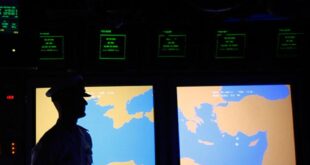Iran considers itself to be the “main winner” of the US-led invasion of Iraq and the toppling of former Iraqi president Saddam Hussein, with the forthcoming Iraqi constitutional referendum likely to reinforce this sentiment, officials said.
The Islamic republic appears happy to keep a low profile ahead of Saturday’s vote on Iraq’s new constitution, with officials here confident that friendly Shiite or Kurdish groups will consolidate their already strong position.
In addition, Iran sees the vote as another step toward the departure of foreign troops, even if the clerical regime does not expect them to leave in the immediate future.
“Shiites are in a majority in Iraq and can be expected to act as a common force given the repression they suffered under Saddam,” Mohammad Ali Abtahi, a former Iranian vice president, said.
“And naturally, any free election or referendum will benefit the Shiites, the ideological allies of Iran,” he said. “Iran doesn’t even have to do anything for that to happen.”
Iran enjoys close ties with a broad spectrum of Iraqi Shiite groups.
The powerful Supreme Council for Islamic Revolution in Iraq was based in Iran during Saddam’s rule, and Tehran has also established relations with firebrand cleric Moqtada al-Sadr.
Iran also maintains regular contacts with Iraq’s revered Shiite cleric Ayatollah Ali al-Sistani, and has also embraced Iraq’s Deputy Prime Minister Ahmed Chalabi, a one-time Washington favorite.
On the Kurdish front, the Islamic republic has had longstanding ties with both the Patriotic Union of Kurdistan, led by Iraqi President Jalal Talabani, and the Kurdistan Democratic Party of Massoud Barzani, who is president of northern Iraq’s semi-autonomous Kurdish zone.
Although these groups may not necessarily be considered Iran’s firm allies, in that they are either lukewarm or hostile to an Iranian-style regime, they are seen in Tehran as known quantities that pose little threat and that can be influenced.
“We should not emphasize the divisions between Shiites and Sunnis or between Arabs and non-Arabs. But if there are democratic rules, the majority Shiites should strengthen their position,” Kazem Jalali, spokesman for the Iranian parliament’s Foreign Policy Commission, said.
“Naturally, Iran does have a certain influence in Iraq as a result of its influence with the different groups, namely the Shiites and Kurds,” he said.
Such influence is a welcome change after Saddam, who attacked Iran in 1980 and sparked a devastating war that dragged on for eight years.
As one Tehran-based Western diplomat said: “Iran now considers itself to be the main winner of the US invasion.”
But Iran’s other concern is the continued presence of US and British troops in Iraq, and in this regard the Islamic republic’s position is far more cloudy.
Publicly, Iran has been calling for the withdrawal of foreign forces and insists it is not backing insurgents because the insecurity that rebel attacks cause is delaying such a pullout.
Iran is also welcoming the referendum as a step toward US and other foreign troops going home.
“If the US intervention was aimed at toppling Saddam, this referendum and the setting up of new Iraqi institutions will leave no pretext for the foreign forces to stay,” Jalali said.
But Tehran is also accused of backing both Shiite and Sunni rebels — – possibly in a bid to keep US troops bogged down and lessening the American public’s appetite for any eventual strike against Iran over its suspect nuclear program.
Such allegations have been denied by Iranian officials, who blame the very presence of foreign troops for the ongoing violence and appear resigned to having US troops next door for some time to come.
 Eurasia Press & News
Eurasia Press & News



